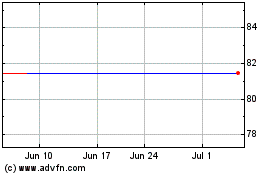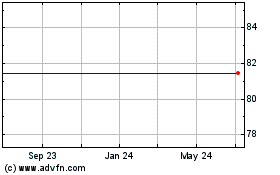Test Aids Prostate Cancer Treatment
July 07 2016 - 1:20AM
Dow Jones News
Genomic Health Inc. has struck a deal to commercialize a new
blood test that can help advanced prostate cancer patients decide
whether to try costly new-generation drugs or rely on much cheaper
traditional chemotherapy to improve their chances for survival.
The test, developed by closely held Epic Sciences Inc., San
Diego, detects a mutation associated with a poor response to two
new drugs, Xtandi from Medivation Inc. and Astellas Pharma Inc. of
Japan, and Zytiga from Johnson & Johnson.
The two blockbuster drugs have significantly extended survival
for many patients with advanced prostate cancer. But in a study
published last month, patients who tested positive for the
anomaly—a variant of the androgen receptor called AR-V7—lived
substantially longer if they were treated with chemotherapy than
those given the two new drugs. The receptor is the target of the
new drugs.
"If AR-V7 was present, the patients didn't respond to the [new]
agents," said Howard Scher, chief of genitourinary oncology at
Memorial Sloan-Kettering Cancer Center, New York. "They progressed
more quickly and they didn't live as long" as those treated with
chemo. Dr. Scher is lead author of the study, which was published
online by the journal JAMA Oncology.
The findings suggest that patients with the variant can improve
their survival chances while avoiding use of the more-costly
therapies. Xtandi is priced at more than $10,000 a month while
Zytiga lists at about $8,600. Docetaxel and cabazitaxel, the
standard so-called taxane chemotherapies for advanced prostate
cancer, cost several hundred dollars a month, researchers said.
"You get both improved clinical outcome and economic benefits to
the health system," said Murali Prahalad, Epic's president and
chief executive.
The retrospective study involved 161 men. Researchers said the
test needs further validation in larger, prospective randomized
trials. The companies believe the recent study, and previous
research linking a poor response to the two drugs to the AR-V7
variant, are sufficient validation for clinical use, said Phil
Febbo, Genomic Health's chief medical officer. They plan to launch
the test early next year while more rigorous studies are under way.
The price hasn't been determined.
The companies estimate that about 50,000 U.S. patients a year
have advanced prostate cancer that has progressed after standard
hormone therapy and would be candidates for the test as they and
their doctors consider treatment with the new agents. Studies
suggest as many as 20% may have the AR-V7 variant, or acquire it as
their tumors change during courses of therapy.
The agreement bolsters Genomic Health's portfolio of cancer
diagnostic tests intended to help doctors tailor treatment based on
the molecular traits of their patients' tumors. Its OncotypeDX line
of tests for breast, prostate and colon cancers gives patients with
early-stage disease information on whether they're likely to
benefit from chemotherapy—or in the case of the prostate, other
aggressive care—as part of their treatment. The new pact is part of
Genomic Health's plan to provide diagnostics to guide treatment for
metastatic, or advanced disease.
The test is called a liquid biopsy because it analyzes blood
instead of tumor tissue to determine if the mutation is present. It
is based on technology that cannot only detect AR-V7 but also
determine whether it is in the nucleus of individual tumor
cells.
The presence of the AR-V7 in the nucleus is a key factor in
whether patients respond to the new drugs, Dr. Scher said. In the
study, no patient determined to have the variant in a single tumor
cell's nucleus responded to either Xtandi or Zytiga.
In the study, a positive test for AR-V7 didn't assure patients
would respond to the chemotherapy, nor did a negative test promise
a response to the Xtandi or Zytiga.
Under the agreement, which covers commercializing the test in
the U.S., Genomic Health is making an equity investment in Epic.
Specific financial terms weren't disclosed.
Qiagen NV of Germany and Tokai Pharmaceuticals Inc., Boston, are
codeveloping an AR-V7 liquid biopsy test based on different
technology as a diagnostic test for Tokai's experimental
prostate-cancer drug called galeterone intended to treat men who
test positive for AR-V7.
Write to Ron Winslow at ron.winslow@wsj.com
(END) Dow Jones Newswires
July 07, 2016 01:05 ET (05:05 GMT)
Copyright (c) 2016 Dow Jones & Company, Inc.
Medivation, Inc. (MM) (NASDAQ:MDVN)
Historical Stock Chart
From Mar 2024 to Apr 2024

Medivation, Inc. (MM) (NASDAQ:MDVN)
Historical Stock Chart
From Apr 2023 to Apr 2024
